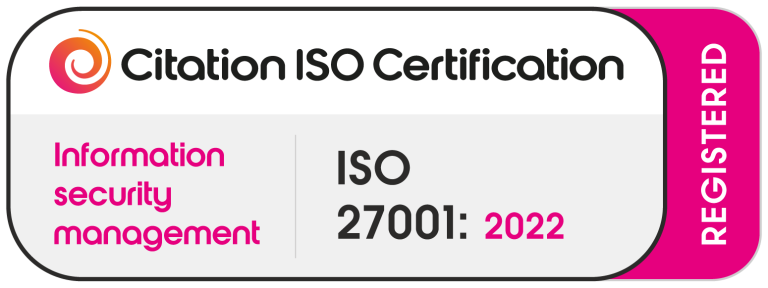On average, businesses can achieve certification within 3–6 months, depending on size, complexity, and readiness. Smaller organisations with simpler systems may achieve it faster. With Citation ISO Certification you can achieve certification in as little as 45 days.
What is ISO 27001?
Find out more about what ISO 27001 is and how it can benefit you
ISO 27001 certification at a glance
- Standard: ISO/IEC 27001:2022
- Focus: Information Security Management (ISMS)
- Includes: 10 Clauses + 93 Annex A controls
- Certification: Yes – issued by accredited certification bodies
- Review cycle: Surveillance audits annually, recertification every 3 years
- Who it’s for: Any organisation managing sensitive data or client information

When it comes to protecting your business from data breaches, cyber threats, and compliance risks, ISO 27001 is the gold standard. But what exactly is it?
ISO/IEC 27001 is the internationally recognised Standard for managing information security. Certification means your organisation has been formally audited and approved as compliant. Published by the International Organization for Standardization (ISO), the ISO 27001 provides a best-practice framework for putting the right policies, procedures, and controls in place to manage information security risks effectively.
As ISO.org explains: “The ISO/IEC 27001 standard provides companies of any size and from all sectors of activity with guidance for establishing, implementing, maintaining and continually improving an information security management system.”
What sets ISO 27001 apart is its holistic approach. This isn’t just about IT. ISO 27001 is a whole-business approach to information security, helping you manage risks across people, processes, and technology. The Standard helps you prevent, detect, and respond to threats in a structured and proactive way, while also supporting compliance with data protection laws and industry regulations.
Achieving ISO 27001 certification demonstrates a clear commitment to protecting sensitive information, reducing the risk of breaches, and meeting both legal and contractual obligations.
Why is ISO 27001 so important?
Every organisation handles valuable information – whether it’s customer data, employee records, financial details, or intellectual property. And with 43% of UK businesses hit by a cyber attack in 2024 and ransomware demands averaging £4m (gov.uk), the risks are clear. As cyber threats grow more sophisticated and data protection laws tighten, ISO 27001 has become essential for businesses of all sizes.
This Standard helps:
-
Keeps data safe – protect the information you hold from loss, misuse, or unauthorised access, reducing the risk of attacks that could cripple your business.
-
Support compliance – makes it easier to meet legal and regulatory requirements like GDPR, avoiding penalties and reputational damage.
-
Reduce risk of data breaches and penalties – spot and reduce risks before they result in fines, downtime, or financial losses.
-
Build trust – show clients, partners, and stakeholders that you take information security seriously, helping you secure new contracts and retain existing business.
-
Improve internal governance and accountability – embed a security-first mindset across your teams and processes.
-
Strengthens business continuity – improve your resilience to cyber incidents and recover faster from disruptions like ransomware attacks.
-
Open doors – many tenders, contracts, and frameworks now require ISO 27001 certification as a minimum standard, giving you a competitive advantage
What are the ISO 27001 requirements?
From SMEs to multinationals, any organisation that collects, stores, or processes data can benefit. It’s especially valuable for:
- Technology providers: Demonstrate strong data security to customers and investors while reducing cyber risks across software, SaaS platforms, and IT services.
- Financial institutions: Protect client financial data, comply with FCA regulations, and maintain customer confidence in an industry with high fraud and breach risks.
- Healthcare organisations: Secure patient records, meet data privacy regulations, and minimise the reputational and financial impact of breaches.
- Legal firms: Safeguard confidential client information, meet client due diligence requirements, and build trust in high-stakes legal matters.
- Government agencies: Strengthen defences against cyber attacks, ensure compliance with national security standards, and protect citizen data.
- Businesses working with regulated industries or public contracts: Meet supplier security requirements and win bigger deals faster.
- Businesses handling personal or client-sensitive data: Reduce the risk of data breaches and demonstrate GDPR compliance.
Whether you’re a startup or a global enterprise, ISO 27001 shows that you take information security seriously.
What are the benefits of ISO 27001 certification?
Protect your business
Minimise the risk of cyber attacks and data breaches with a proven security framework that reduces vulnerabilities and protects sensitive information from costly threats like ransomware.
Demonstrate credibility
Build trust with customers, partners, and stakeholders by showing you meet an internationally recognised Standard for information security.
Meet legal and regulatory requirements
Easily align with GDPR and other data protection laws, reducing the risk of fines and helping you stay audit-ready.
Gain a competitive advantage
Stand out in tenders and contracts where ISO 27001 is required or preferred, giving you an edge over competitors and opening doors to new opportunities.
Improve risk management
Identify, assess, and reduce security threats proactively so you can address issues before they impact your business or reputation.
Operational resilience
Strengthen business continuity and disaster recovery so you can respond quickly to incidents and minimise disruption.
92% of our clients feel their business is more secure with ISO 27001 in place.
(Based on Client Feedback Survey).

What are the ISO 27001 requirements?
ISO 27001 is built around ten core clauses, covering everything from setting the right leadership direction to managing risk and measuring performance.
The ten clauses of ISO 27001:
-
Scope – Defines the boundaries of your ISMS and the information it will protect.
-
Normative references – Lists supporting standards and documents relevant to ISO 27001..
-
Terms and definitions – Clarifies the terminology used throughout the Standard for consistency.
-
Context of the organisation – Requires you to understand internal and external factors that affect your ISMS.
-
Leadership – Outlines the role of senior management in driving, supporting, and reviewing your ISMS.
-
Planning – Focuses on setting objectives and addressing risks and opportunities related to information security.
-
Support – Ensures you have the right resources, training, and awareness in place to run your ISMS effectively.
-
Operation – Covers the implementation of security controls and processes to manage information security.
-
Performance evaluation – Involves monitoring, measuring, and auditing your ISMS to ensure it remains effective.
-
Improvement – Requires continual improvement based on audit findings, performance data, and changing risks.
Each clause plays a critical role in creating a compliant, strong, and sustainable ISMS. On top of that, ISO 27001 includes Annex A —a detailed list of 93 security controls grouped under four themes: People, Organisational, Physical, Technological. These controls act as a toolbox. You don’t have to use all of them—but you’ll need to assess which ones apply to your business and implement what’s relevant.
Want to explore all 93 controls in more detail? See our full Annex A breakdown here.
What changed in ISO 27001:2022?
In October 2022, the ISO 27001 Standard was updated with several changes to the structure. ISO 27001:2022 is the latest version of the Standard, which replaced the previous version – ISO 27001:2013
The 2022 update streamlined the Annex A controls, reducing the total from 114 to 93 controls, reorganised into four themes:
- People (8 controls – ISO 27001 6.1-6.8)
- Organisational (37 controls – ISO 27001 5.1-5.37)
- Technological (34 controls – ISO 27001 8.1-8.34)
- Physical (14 controls – ISO 27001 7.1-7.13)
Use our simple comparison table to see what’s changed.
This modernisation helps businesses stay aligned with emerging cyber risks and cloud-native environments.

ISO 27001:2022 vs ISO 27001:2013 Comparison
| ISO/IEC 27001:2013 | ISO/IEC 27001:2022 | |
|---|---|---|
| Number of controls | 114 | 93 |
| Groupings | 14 categories | 4 themes |
| New controls | Training plans and register including any documentary evidence that training has taken place e.g. a training matrix – Section 4.4.2 | 11 new controls. Includes: Threat intelligence Cloud services ICT readiness for business continuity Physical security Configurations management Information deletion Data masking Data leakage protection Monitoring activities Web filtering Secure coding |
| Use of attributes | Not used | Introduced to help organisations classify and filter controls (e.g. by purpose or type) |
How to implement ISO 27001
Implementing ISO 27001 typically involves the following steps:
- Get leadership on board.
Secure buy-in from senior management to make and set clear information security objectives aligned with your business goals. - Define your scope
Establish your ISMS scope and decide which areas and information assets it will cover. - Carry out a risk assessment
Identify the risks your business faces, assess their impact, and plan the security controls needed to manage them. - Put policies in place
Create clear, practical policies and procedures that meet ISO 27001 requirements and support daily operations. - Apply security controls (Annex A)
Implement your chosen measures, such as encryption, access management, and physical safeguards. - Train your team
Help staff understand their role in protecting information, from recognising threats to following secure practices. - Check, review and improve
Regularly review your ISMS performance with internal audits and updates to keep it effective and up to date. - Prepare for certification
Work with an accredited certification body through Stage 1 (documentation review) and Stage 2 (certification audit).
Tip: You’ll need to document processes like risk assessments, incident response, and asset inventories. We guide you through every step of the journey, from planning to audit.
ISO 27001 certification process
To achieve certification, your organisation must elect an accredited certification body. Certification typically involves:
- A Stage 1 audit – reviewing your documentation and readiness
- A Stage 2 audit – assessing how effectively your ISMS is operating
- Receive your certificate (usually valid for three years with annual surveillance audits)
The certification process typically takes 3–6 months, depending on the size and complexity of your organisation. But with our expert support certification can often be achieved in as little as 45 days.
Why choose Citation ISO Certification for ISO 27001 certification?
With over 33,000 certifications issued and a team of 60+ auditors nationwide, we make 27001 certification faster, simpler, and more cost-effective. Here’s why 30,000+ UK businesses trust us:
- Fixed-fee pricing with no hidden costs
- ASCB-accredited certification
- Online management tools for ISMS
- A dedicated consultant guiding you from start to finish
- Ongoing compliance advice
Frequently Asked Questions
How long does it take to get ISO 27001 certified?
Is ISO 27001 mandatory?
What businesses need ISO 27001?
How much does ISO 27001 certification cost?
How long does the certification last?
Can an individual be ISO certified?
Do I need to renew my certification?
Is ISO 27001 just for IT teams?
What is the difference between GDPR and ISO 27001?
Try Our Fee Calculator
To find out what an ISO Certification could cost your organisation, simply complete the form below.
Want a faster, more personalised quote?
Skip the wait! Call us now on 0333 344 3646 for quick, tailored pricing, and exclusive discounts.
Your Quote has been emailed to you
Not received your email yet? Quotes will typically arrive instantly, but please allow 5-10 minutes depending on your email client and remember to check your junk folders. Why not check out some of our other services while you wait…
Prefer to speak directly with one of our Certificate Development Consultants? Please call us on 0333 344 3646
Please note that the fees quoted are based on one office, in one location, in the UK mainland.



